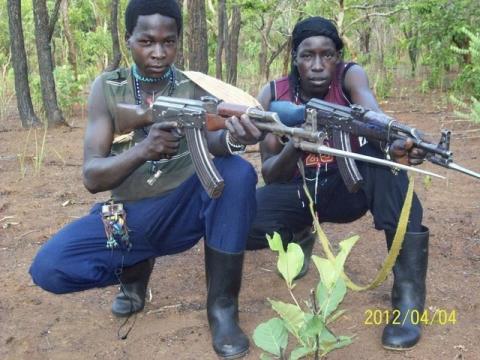Advertisement
Rebels in Central African Republic stepping up attacks - U.N
UNITED NATIONS (Reuters) - Lord's Resistance Army rebels, who mutilate civilians and kidnap children to use as fighters and sex slaves, stepped up attacks and abductions in Central African Republic during the first three months of this year, the United Nations said on Wednesday.
The U.N. envoy for Central Africa, Abdoulaye Bathily, also told the U.N. Security Council that the world body was concerned about the potential Ugandan withdrawal of some 2,500 troops from a military operation hunting down the brutal rebel movement.
"The LRA appears now to be deviating from what had been for a certain period of time a low-profile posture, with attacks against larger and less isolated populations areas being noted and an increased number of children kidnapped," he said.
The International Criminal Court has issued arrest warrants for the LRA's messianic leader, Joseph Kony, and other senior commanders. The rebels were relatively unknown outside Central Africa until KONY 2012, a successful social media campaign, raised international awareness about the reclusive warlord.
The latest U.N. report to the Security Council, citing LRA Crisis Tracker data, said the rebels were responsible for 42 incidents, six civilian deaths and 252 civilian abductions in Central African Republic in the first quarter of 2016.
This compares with 52 incidents, five civilian deaths and 113 civilian abductions for all of 2015.
"The LRA has demonstrated increased boldness," according to the report. "The surge could be attributed to the dry season, the alleged forced withdrawal of LRA groups from the Kafia Kingi enclave, and some LRA groups operating independently from Joseph Kony's command."
Uganda leads a U.S.-supported African Union regional task force tracking the LRA rebels, but said last week it plans to withdraw its troops by the end of the year. Most of its soldiers are in eastern Central African Republic, while a smaller contingent is based in South Sudan.
"The withdrawal of the Ugandan troops may create a vacuum which may be used not only by the LRA but also the other armed groups which are in the region," Bathily told reporters.
Originally from northern Uganda, the LRA was driven out by a military offensive a decade ago. Today, its fighters roam a poorly policed area straddling the borders of Central African Republic, Democratic Republic of Congo and South Sudan.
(Reporting by Michelle Nichols; Editing by Alan Crosby)



















Add new comment